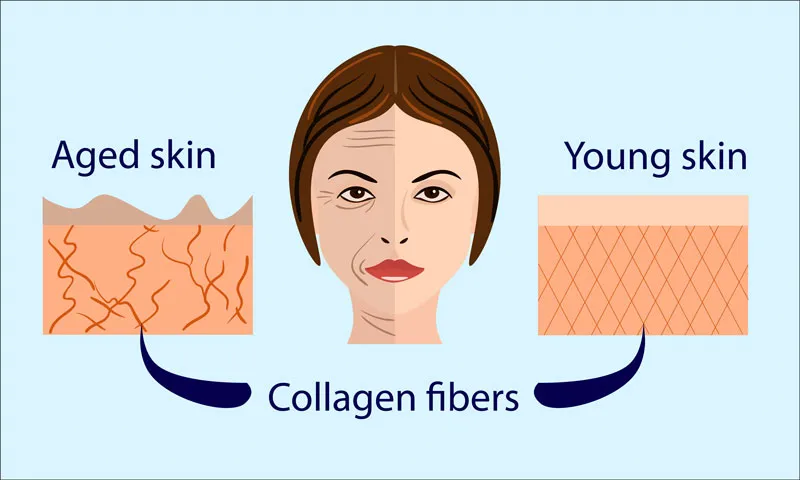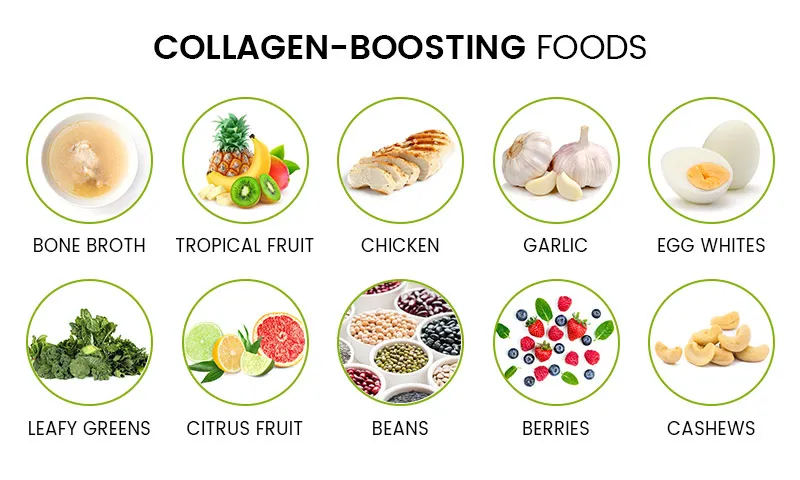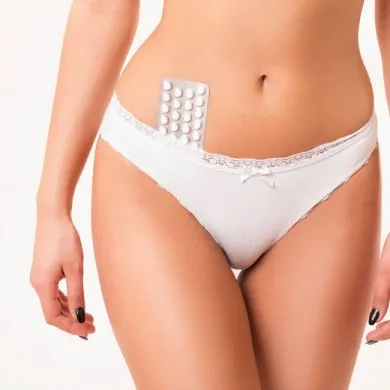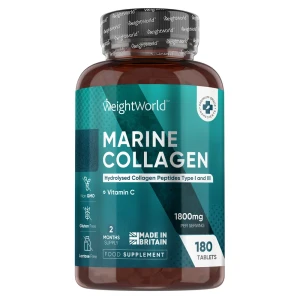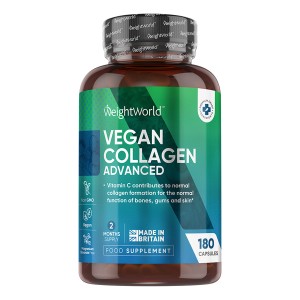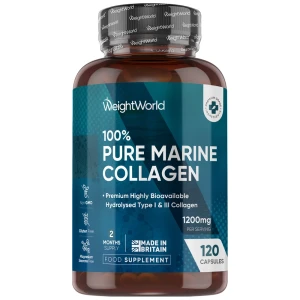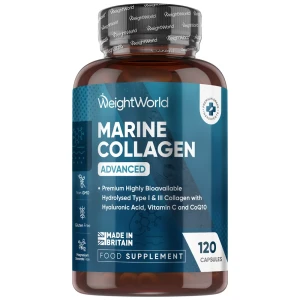However, one of the most holistic and beauty-from-within approaches is to take a route of "Collagen", nature's beauty-boosting and anti-ageing powerhouse. That's the reason why Collagen supplements have taken the beauty world by storm. From serums to powders and capsules, collagen is found in every possible form. It seems that everyone is obsessed with increasing their collagen intake.
Before you start increasing your collagen level though, here's everything that you need to know about this natural beauty supplement.
What Is Collagen?
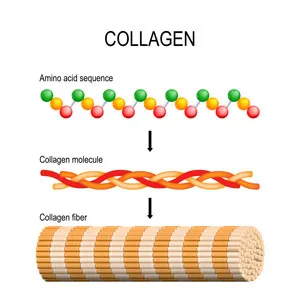
The word collagen is derived from the Greek word “Kollagen”, where “Kolla” stands for glue and the “gene” stands for something that produces. In simpler words, collagen is a “glue-producing” protein that holds the body’s tissues together and supports them. It is our body’s most essential building block that makes up to 30% of our proteins.
To be more specific, collagens make up (by dry weight):
- Muscle mass: 1-10%
- Bones: 30%
- Cartilage: 60%
- Skin: 70-80%
- Tendons: 80%
- Sclera (outer layer of the eyeball): 90%
All in all, collagen is the most abundant protein and can be found in every connective tissue. On a microscopic level, collagen is triple-helical in shape. Let’s ponder deeper for better understanding.
Different kinds of cells in the body tissues trigger the production of collagen. By using specific amino acids and peptides as building blocks, these different cells build a large collagen helix structure which is later organised to form long fibrils. This helps in supporting the body's connective tissues, flexibility and the ability to withstand external force. Highly resilient collagen also aids in tightening skin cells and strengthening blood vessels.
A Comprehensive Guide On Different Types Of Collagen
If you are in the market looking for collagen tablets or supplements, you would have probably heard about the different collagen types. So what exactly are those types and which one should you take?
Well, there are many different types of collagen (at least 28) found in our body. Amongst them, 80-90% of them belong to Type I, Type II and Type III. All types of collagen can benefit your skin, hair, nails, and bones as all of them are primarily made up of beneficial amino acids. However, to still give you a better insight, here’s the deal with the different collagen types.
-
Type I Collagen
Undoubtedly, it is one of the most abundant protein found in our body and it helps to form our bones, blood vessels, corneas, tendons and other connective tissue. It not only supports in reducing wrinkles and fine lines but also improves hydration and skin elasticity. If you are in search of collagen for skin health, Type I is what you need to get.
With our increasing age, the level of the collagen decreases. That’s why you need to take a Type I collagen supplement to boost its levels. Acting as a building block of the skin, it is perfect for wound-healing as well. One of the best sources of Type I is marine collagen.
-
Type II Collagen
Type II is majorly found in cartilage and is extremely beneficial for its health. Cartilage is a connective tissue which protects the long bones at the joints. Plus, it’s a structural component of the nose, the rib cage, the ear, the bronchial tubes and more. That's why Type II is considered highly beneficial means of reinforcing joints and improving the symptoms of arthritis.
One of the best sources of Type II collagen is organic bone broth protein. It also contains glucosamine sulfate and chondroitin sulfate which is popular for treating general joint issues and arthritis.
-
Type III Collagen
Often associated with Type I, Type III belongs to fibrillar collagen and is an essential component of organs and skin. It supports the structure of muscles, organs and arteries while also helping in maintaining the functional integrity of the heart.
Type III is abundant in Bovine Collagen Peptides which is derived from the skin, bones and muscles of the cow.
Collagen Type Type I Type II Type III Use Helps to form our bones, blood vessels, corneas, tendons and other connective tissue. Also useful for wrinkles and skin elasticity. It’s a structural component of the nose, the rib cage, the ear, the bronchial tubes and more. Also helps boost joint health. Supports the structure of muscles, organs and arteries while also helping in maintaining the functional integrity of the heart. Best Source Marine Collagen Supplements Organic bone broth protein Bovine Collagen Peptides -
Other Types of Collagen
Type IV is reticular collagen and helps with filtration. It is mainly found in the basement membrane and in the layers of the skin.
Type V is a fibre associated collagen which is mainly found in the extracellular matrix of the skeletal muscles. It is also essential for creating the cells of pregnant woman's placenta.
Type X is network-forming collagen and is mainly found in cartilage. It also aids in the growth of new bone in joint cartilage.
Everything You Ought To Know About Collagen Peptides & Hydrolyzate
The human body isn't able to effectively absorb collagen in its natural state. That’s why it first goes through a hydrolysis process where the large collagen molecules are broken down into smaller units which are known as collagen peptides. It is more bioavailable and contains high concentrations of the amino acids.
As they are shorter chains of amino acids, they get easily absorbed into the blood cells upon digestion. Additionally, they are also tasteless and odourless, making them a perfect dietary supplement.
What Is Collagen hydrolyzate?
Collagen Hydrolyzate, Hydrolyzed collagen and collagen peptides are the names of the same product. Yes, you got that right. As mentioned above, full-size collagen is broken down into smaller chains through a hydrolysis process, and thus collagen peptides are often referred to as hydrolysed peptides and collagen hydrolyzate too.
6 Important Signs That Reflect Collagen Deficiency
- Wrinkles
- Cellulite
- Loss of mobility
- Muscle ache
- The issue with blood flow
- Joint pain
Did You Know Collagen Can Help With The Appearance of Wrinkles?
Responsible for 75% of the organic material in your skin, undoubtedly, collagen is a key element of your skin. It plays a pivotal role in not only in strengthening skin but in benefitting hydration and elasticity as well. As we get older, our body tends to produce less collagen which leads to dry skin and the formation of wrinkles. [2] There are studies which supports the fact that collagen supplements of collagen peptides can help slow down the premature ageing and reducing the appearance of wrinkles and dryness. [3]
Wound healing properties of collagen aids in the faster healing of acne scars and other skin blemishes. Moreover, collagen also helps in healing the skin damaged by harmful UV rays. Regularly ingesting collagen can boost the skin repair process while encouraging your body to form new collagen.
Collagen For Bone & Joint Health
Type 2 Collagen is usually found in the cartilage (a tissue that protects the joints). As you get older, the amount of collagen gradually decreases in your body which increases the risk of developing degenerative joint disorders such as osteoarthritis.
There are many studies supporting the intake of a collagen supplement in order to reduce joint pain and help improve osteoarthritis. [4] Researchers have shown that the supplementary collagen gets collected in cartilage and stimulate the tissues to produce collagen. Moreover, you can also consume collagen-rich foods to reduce arthritis pain support the joints, reducing pain, improving flexibility and lowering inflammation.
Other Important Benefits & Uses Of Collagen:
-
Gut Health
Are you suffering from leaky gut syndrome? Taking a collagen supplement can help. It infuses remedial amino acids which aids in breaking down proteins and soothes your gut while healing damaged cell walls.
Amino acids in collagen also help build the tissues that line the GI (gastrointestinal) tract and the colon while helping in treating GI disorders. As a result, it not only effective in healing leaky gut syndrome but has also proven to be highly beneficial in ulcerative colitis, Crohn’s disease and acid reflux.
-
Boosts Metabolism & Energy Levels
Collagen helps in the conversion of vital vitamins and minerals, which in turn helps in increasing your metabolism and adds lean muscle mass to the frame. By consuming collagen with vitamin C, it ensures that your body converts the collagen into a useable protein which aids in reinstating the source of your vitality and energy.
Moreover, it has been found that glycine plays a vital role in the functioning of both the digestive and central nervous system which is essential for maintaining a youthful and healthy body. Plus, it aids in enhancing the body's use of antioxidants which supports in slowing down the effects of ageing.
-
Strengthens Hair, Teeth & Nails
Do you have brittle and peeling nails? Are you suffering from hair thinning issues? Well, collagen deficiency is responsible for it. Collagen is an essential building block of your hair, teeth and fingernails. Having a balanced diet enriched with collagen protein can help in reversing the signs of hair loss and keeps your nails strong.
As per one study [1] it has been found that there’s an important relationship between hair follicle regeneration and extracellular matrix (ECM) and collagen can therapeutically target the hair loss and other skin-related concerns.
-
Enhance Liver Health
Did you know collagen can be extremely helpful in detoxifying your body and improving your heart and liver health? Glycine helps in lessening the damage your liver experiences by absorbing foreign substances like toxins and alcohol. You will be also surprised to know that the glycine can also be used in minimising alcohol-induced liver damage and other forms of chronic or acute liver injury.
-
Protects Cardiovascular Health
The amino acid proline aids in minimising fat accumulation by helping your artery walls discharge fat build-up in the bloodstream. It assists in controlling blood pressure and repairs the tissue within the arteries and joints.
Additionally, arginine supports the production of nitric oxide which allows better vasodilation, allowing better circulation.
Foods That Boost The Formation Of Collagen In Your Body
Your body combines amino acids and nutrients from protein-rich food in order to make collagen. Beef, fish, chicken, eggs and dairy products are some of the best protein-rich food that you may need to intake. This conversion process also requires vitamin C, copper and Zinc. While vitamin C can be derived from citrus fruit, green and red peppers, tomatoes and leafy greens, minerals can be obtained from meats, whole grains, nuts and beans.
However, as you age, your body slows down the process of absorbing nutrients and synthesise them efficiently. To ensure that your body maintains a healthy level of collagen, you need to start taking dietary collagen tablets daily.
Listed below are the best collagen-boosting foods:
Tips To Boost The Collagen Effects
- Have a balanced diet that is rich in proteins, Omega-3 fatty acids, vitamin A and contains antioxidants.
- If you are a non-vegan, consider consuming bone broth daily.
- Caffeine may have an adverse effect on wound healing and skin ageing process. Thus, limit or cut caffeine intake.
- Red light therapy can stimulate and increase the production of collagen in the skin.
- Regular exercise can protect your collagen levels and help fight the ageing signs.
- Retinol derived from vitamin A helps boost collagen level.
- Ginseng found in tea and supplement helps in increasing the amount of collagen.
Side Effects Of Collagen & Its Overdose
Fortunately, there are no known side effects of collagen and is considered as Generally Recognised As Safe (GRAS). The common reason for people experiencing side effects is that either they have pre-existing allergies or have exceeded the recommended dosage.
Some of the most common side effects of Collagen gelatine supplements are bloating and stomach upset. This is usually due to the larger size of its protein. If you are allergic to beef, you should definitely avoid taking bovine collagen. Marine collagen would be a good substitute.
Also if you are pregnant or currently on any medication, kindly consult with your doctor to ensure that the collagen supplements don’t interfere with the effectiveness of your current medicines.
Important FAQs Related To Collagen:
-
If collagen is abundant in my body, why do I need to take it?
As we get older, there is a reduction in collagen production of our body. Unfortunately, the natural production of collagen begins to slow down in the mid-20s and the signs of ageing begin to appear. But, don’t worry. You can maintain healthy natural collagen levels by adding a collagen supplement in your daily diet.
-
Why Marine Collagen is better than bovine?
Marine collagen is tasteless and is full of beauty benefits. It has superior absorption capabilities than compared to other sources of hydrolysed collagen. Moreover, marine collagen delivers a unique balance of glycine, amino acids, proline and hydroxyproline. Additionally, it is recognised as the most bioavailable form of collagen, which results in better and faster absorption.
-
Is it safe for long term usage?
The simple answer is yes. Collagen consists of amino acids which are defined as food. The collagen supplements are formulated to provide vital nutrients to your body and support its ability to restore and build natural collagen. But, if you still have any doubts, kindly consult with a healthcare professional.
-
Are collagen peptides protein?
Yes, they are pure protein. They do not contain any artificial flavours, sweeteners, sugar, gluten, fat, carbohydrates. Moreover, they don’t contain any preservatives and additives.
-
Are there any side effects?
Until now, no known side effects have been reported. However, it is recommended that you don’t take it on an empty stomach or else it may cause intestinal discomfort.
The Bottom Line
Collagen supplements seem to be the latest health and beauty trend, even though their benefits aren’t backed by science. However, if you are looking for quality protein to add to your meals, then taking collagen tablets is the way to go. They are convenient and easy-to-swallow. You can also add collagen powder into a wide range of dishes and drinks any time of the day.
Collagen peptides deliver you a wide range of health benefits. They will not only keep your skin looking youthful but also protect your bones and joints. Consider giving it a try, and you won’t regret the decision.
References:
- National Center for Biotechnology Information, PMID: 25989472, Oct 2015
- National Center for Biotechnology Information, PMCID: PMC3583892, Jul 2012
- National Center for Biotechnology Information, PMID: 23949208, Aug 2014
- National Center for Biotechnology Information, PMID: 17076983, Nov 2006
